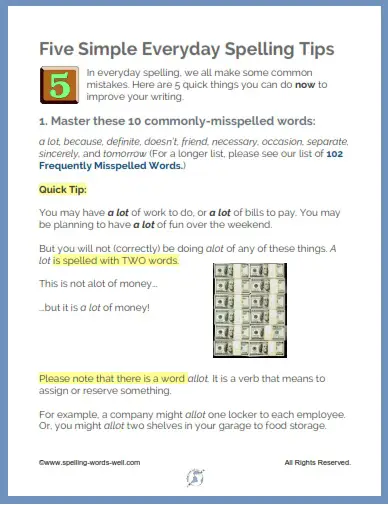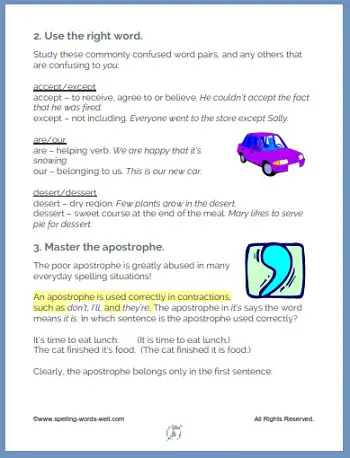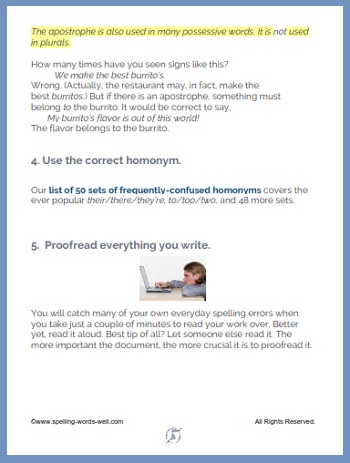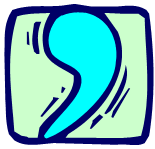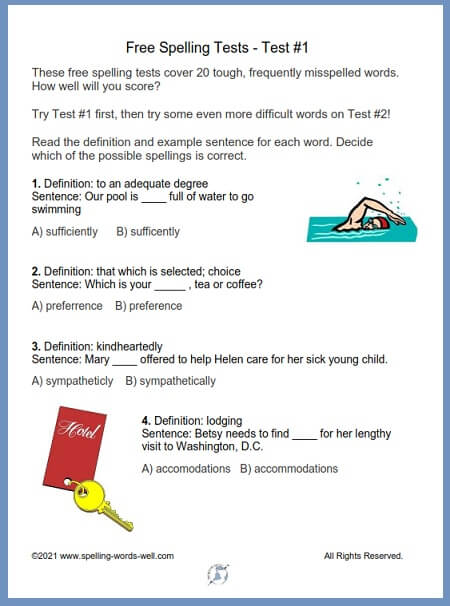Everyday Spelling Tips
In everyday spelling, we all make some common mistakes. Here are 5 quick things you can do now to improve your writing.
Five Key Everyday Spelling Tips
Here's a peek at our favorite quick tips. Download the free printable shorter version here, or read below to find the slightly expanded information!
1. Master these 10 commonly-misspelled words:
Many spellers can improve their writing simply by mastering these ten words: because, a
lot, definite, doesn’t, friend,
necessary, occasion, separate, sincerely, and tomorrow. (For
a longer list,
please see our list of 102
Frequently Misspelled Words.) These ten words account for a large number of frequent spelling errors.

Quick Tip:
You may have a lot of work to do, or a lot of bills to pay. You may be planning to have a lot of fun over the weekend.
But you will not (correctly) be doing alot of any of these things. A lot is spelled with TWO words.
This is not alot of money...
...but it is a lot of money!
Please note that there is a word allot. It is a verb that means to assign or reserve something.
For example, a company might allot one locker to each employee. Or, you might allot two shelves in your garage to food storage.
ALSO, try some mnemonic devices to help you remember your biggest spelling demons. For example, if you're prone to mistakenly write/type becuase, like so many other people, try this. As you write the word, say to yourself,
" 'Be calm and useful, says Ed.' "
The first letters of the words in this phrase will remind you of the correct order of the letters in BECAUSE.
2. Use the right word.
Study these commonly confused word pairs, and any others that are confusing to you.
accept/except
accept – to receive, agree to or believe. He
couldn’t accept the fact that he was
fired.
except – not including. Everyone
went to the store except Sally.
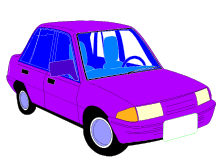
are/our
are – helping verb. We
are happy that it’s snowing.
our – belonging to us. This
is our new car.
desert/dessert
desert – dry region. Few
plants grow in the desert.
dessert – sweet course at the end of the meal. Mary
likes to serve pie for dessert.
3. Master the apostrophe.
The poor apostrophe is greatly abused in many everyday spelling situations!
An apostrophe is used correctly in contractions, such as don’t, I’ll, and they’re. The apostrophe in it’s says the word means it is. In which sentence is the apostrophe used correctly?
It’s
time to
eat lunch.
(It is time to eat
lunch.)
The cat
finished it’s food. (The
cat finished it
is food.)
Clearly, the apostrophe belongs only in the first sentence.
The apostrophe is also used in many possessive words. It is not used in plurals.
How many times have
you seen signs like this?
We make the best burrito’s.
Wrong. (Actually, the restaurant may, in fact, make the best
burritos.) But
if there is an apostrophe, something must belong to
the burrito. It would be correct to
say,
My burrito’s flavor is out of
this world!
The flavor belongs to the burrito.
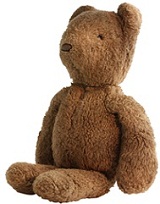 Is the bear bare?
Is the bear bare?4. Use the correct homonym.
Our list
of 50 sets of
frequently-confused homonyms covers the ever popular their/there/they’re, to/too/two, and 48
more sets.
Many writing errors fall into this category. Tell me how many times you've accidentally written--or seen--mistakes like these:
I'm not to hungry yet, so let's wait on dinner. (The to should be too.)
If your done with your homework, you may watch TV. (The your should be you're.)
Its time to go outside. (The Its should be It's.)
Let's go over to there house tonight. (The there should be their.)
5. Proofread everything you write.

You will catch many of your own everyday spelling errors when you take just a couple of minutes to read your work over. Better yet, read it aloud. Best tip of all? Let someone else read it. The more important the document, the more crucial it is to proofread it.
Quick Quiz
Read these three sentences. See if you can spot all the errors. Check your answers at the blue "Show the Answer" button below.
1. I'll need more patients if I have to weight for another our!
2. Its not neccessary to send money becuase I will get payed on Friday.
3. My freind makes the best choclate cream pie for desert.
You May Also Like...
Free Spelling Tests - These free spelling tests cover 20 tough, frequently misspelled words. In this convenient format, kids and adults can test themselves. How well will you score?
Step-By-Step Spelling Lesson Plans - Here's a very methodical way to teach, or learn, those tricky IE/EI words. Great for ESL students, upper elementary students, or adults. You can use every step of this lesson, or just the ones that you need. This free printable lesson includes a link to big list of IE/EI words for extra study and practice.
FAQs
Q: What are some of the most common everyday spelling errors?
Q: What are some of the most common everyday spelling errors?
A: Here are three common mistakes:
1) Misspelling one of the most frequently misspelled words (because, a lot, separate, definite, etc.).
2) Using the wrong homophone. Examples include using to instead of too, or there instead of their, and so on.
3) Incorrectly using apostrophes. Often you'll see signs for Sub's on Sale, or Buy Car's Here. These words should be plurals, not possessives. No apostrophes are needed.
Q: What is a simple way to improve my everyday spelling?
Q: What is a simple way to improve my everyday spelling?
A: Many errors can be spotted simply by proofreading your own work before sending it or printing it. If you're still not sure of your spelling choices, always ask another person to also proofread your document. The more important the document, the more crucial the proofreading!
2. It's not necessary to send money, because I will get paid on Friday.
3. My friend makes the best chocolate cream pie for dessert.
- Spelling Words Well ›
- Spelling Lessons ›
- Everyday Spelling Tips

